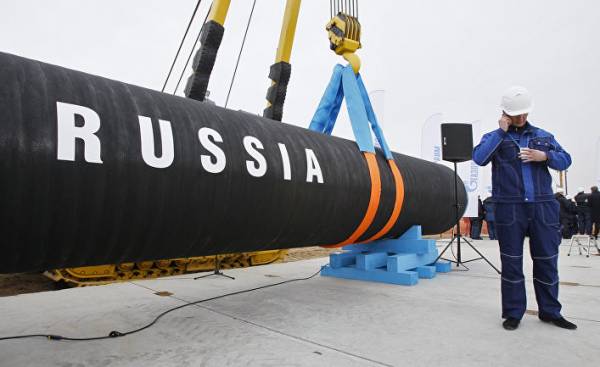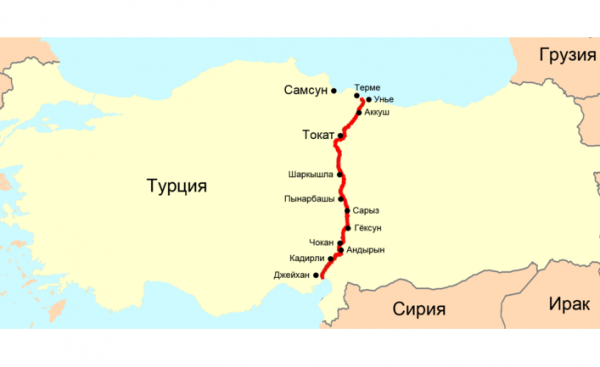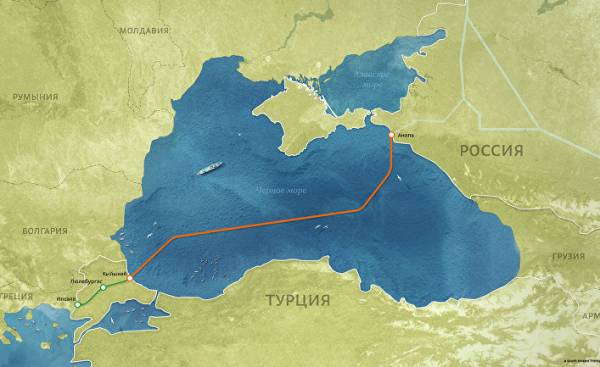
Although at the 22nd World petroleum Congress in Istanbul wanted to give a signal of “cooperation, not conflict,” the struggle for the redistribution portends new crises.
Energy wars are in full swing. At the root of many problems in such energy-rich regions like the middle East, Central Asia, Latin America, lies this energy battle. In the struggle for the redivision with the participation of the United States, Russia, China, Germany, UK, France, EU, Iran, Israel, the Arab countries of the Persian Gulf and joined Turkey, through which transit routes of energy resources. In the background continuing to present challenges, from wars in Syria and Ukraine to the crises around Qatar and Iran, is also the dispute of global and regional players for dominance.
The 22nd World petroleum Congress, which lasted three days in Istanbul came just at the time of these energy crises. The summit, which was attended by representatives of many countries, primarily the U.S. Secretary of state and former head of the oil and energy giant Exxon Mobil Rex Tillerson, Russia’s energy Minister Alexander Novak, energy Minister of Israel Yuval Steinitz (Yuval Steinitz), became the scene of fierce energy of bargaining.
Israeli gas through Turkey to Europe
Minister Steinitz, adding that he discussed with Turkish energy Minister Albaraka a Berat (Berat Albayrak) the process of construction of a gas pipeline between the two countries, said, “We have decided to conclude an agreement on the construction of the pipeline until the end of the year.” Steinitz, who noted that regional developments related to energy is rapidly changing, drew attention to the fact that Western Europe satisfies its demand in natural gas due to resources of Russia and the North sea. However, North sea resources are approaching depletion, and exploration of the Eastern part of the Mediterranean sea is becoming increasingly important.
“Europe will receive natural gas from the Eastern Mediterranean, and this region will become a reliable source. We are in intensive negotiations for two significant pipeline projects. One of them concerns Turkey. We want to build a pipeline from Israel to Turkey for domestic consumption of Turkey, and to transfer natural gas to Europe. And another project — the pipeline through southern Cyprus and Greece will take place in Italy,” — said Steinitz. It is expected that Turkey will come ten billion cubic meters of Israeli gas.
French Total and Italian ENI started drilling in the Mediterranean sea
In the period when Istanbul held the oil summit, France’s Total and Italy’s ENI have moved into action at the beginning of drilling operations in the territorial waters of Cyprus which will hold the drill ship West Capella. According to a statement by southern Cyprus, it is expected that work on the site under the name “Onesiphorus 1” will be completed in 75 days.
Drilling in the Eastern Mediterranean, causing dissatisfaction of Ankara. While South Cyprus says that the natural gas reserves in the region belong to him, Turkey maintains the view that resources belong to all parties on the island. The Minister of foreign Affairs of Turkey Mevlut Cavusoglu said, “We will not sit idly by and watch these unilateral moves”. But Erdogan, in his speech at the petroleum Congress, said: “In accordance with international law, hydrocarbon resources should belong to all parties on the island. Our expectation from everyone — avoiding steps that could lead to new tensions in the region.” The armed forces of Turkey reported that the frigate “property” taken under the supervision of drill ship off the coast of southern Cyprus.
Important oil and gas pipelines in Turkey
Turkey, being among the regional countries, which account for three quarters of world reserves of oil and natural gas, and European consumer markets, is a strategically important position. This is the privileged position of Turkey as a natural bridge, on the one hand, gives her the best opportunities in the context of energy security, on the other — places it in the center of the energy debate. Turkey, which turned everyone’s attention due to the fact that it is located at the intersection of energy corridors East — West and North — South, is trying to turn this strategic location into an opportunity. It is expected that thanks to these geo-strategic advantages through Turkey, in addition to the current lines will pass many oil and gas pipelines.
Oil
1) “the Kirkuk — Yumurtalik” (the oil pipeline between Iraq and Turkey)
Built in the framework of the agreement on the pipeline was signed between Ankara and Baghdad in 1973, with the purpose of delivering crude oil produced in Iraqi Kirkuk and other production sites, in marine terminal in Ceyhan (Yumurtalik). The first delivery line with a length of 986 km was held in may 1977. In the future, thanks to the second line of annual capacity has been increased to 70.9 million tons. September 19, 2010 agreement to operate the pipeline was extended by 15 years.
 © MinestroneКарта construction of oil pipeline Samsun – Ceyhan
© MinestroneКарта construction of oil pipeline Samsun – Ceyhan
2) The Oil Pipeline “Baku — Tbilisi — Ceyhan”
Focus on transfer of oil produced in the Caspian region, primarily Azerbaijan oil through Georgia to Ceyhan oil pipeline and its delivery to world markets via tankers. The total length of the pipeline — 1,769 thousands of miles away, in Turkey — 1,076 thousand kilometers. Annual capacity of the pipeline, which reaches the terminal in Ceyhan via Tbilisi is the 50 million tons (1 million barrels per day). The oil is first supplied via the pipeline 28 may 2006, 4 June 2006, was in the port of Ceyhan loaded into tankers. The official opening ceremony of the pipeline took place on July 13, 2006 in Ceyhan.
Pipelines
1) The Gas Pipeline “Baku — Tbilisi — Erzurum”
It is a pipeline 690 kilometres to the Turkish border, which according to the Azerbaijani gas from the field “Shah Deniz”, located in the Caspian sea. As a result of negotiations on gas deliveries from the field “Shah Deniz” March 12, 2001 between Turkey and Azerbaijan signed an agreement on the annual supply of 6.6 billion cubic meters of Azeri natural gas to Turkey. The pipeline has been in operation since July 2007. Part of the gas obtained by this route is transferred to Greece on gas pipeline Turkey — Greece, which came into force on 18 November 2007.
2) Gas Interconnector “Turkey — Greece”
In February 2003, as the first stage of the project the southern European gas ring (southern gas corridor), developed within the framework of European Union program INOGATE, an agreement was signed on natural gas supplies from Turkey to Greece, involving the connection of gas transportation systems of Turkey and Greece. In November 2007, the opening of the pipeline. Azerbaijani gas was first exported to Europe via an alternative route. The total length of line — about 300 kilometers, of which 209 kilometers passes through the territory of Turkey. Since 2008, through this line in Greece exports of the natural gas we get from Azerbaijan in the framework of the first phase of “Shah Deniz”.
3) the Western route (gas pipeline “Russia — Turkey”)
The agreement was signed with Moscow in September 1984. The gas coming from Russia via the pipeline that passes through Ukraine, Romania, Bulgaria and Turkey reaches. Capacity of 14 billion cubic meters.
4) Pipeline “Blue stream”
Agreement on the project “Blue stream”, the largest project implemented with Russia in the energy sector, was signed in December 1997. The supply of natural gas through Blue stream began in February 2003. In November 2005 we held the official opening ceremony. 396-kilometer section of the pipeline with a total length of 1,213 thousand kilometers runs under the Black sea. Blue stream gives the opportunity to directly deliver gas from Russia to Turkey.
5) The Gas Pipeline “Iran — Turkey”
The agreement was signed in August 1996. This agreement provided initially supply three billion cubic meters of natural gas a year, and eventually increase to ten billion cubic meters.
 © South Stream Transport B. V. Marine pipeline “Turkish stream”
© South Stream Transport B. V. Marine pipeline “Turkish stream”
6) “Turkish stream”
Signature on “Turkish stream”, which has a strategic importance from the point of view of transmission of Russian gas to Europe via Turkey, was delivered in 2016. This pipeline involves the transfer of Russian gas under the Black sea through Turkey to Greece and Europe. The length of the offshore section of Turkish stream, which will consist of four lines with capacity of 15.75 billion cubic meters, will amount to 910 kilometers.
Pipeline projects
1) the Project TRANS-Anatolian gas pipeline (TANAP)
Thanks to the TANAP project, which forms the skeleton of the southern gas corridor, involving the supply of gas resources of the Caspian basin and the Middle East to Europe via alternative routes, Caspian gas, primarily Azerbaijani natural gas will be delivered to Western markets via the alternative route in large volumes. The groundbreaking ceremony took place on 17 March 2015. It is expected that in mid-2018 the gas will start flowing to Turkey, and in 2020 — in Europe. Currently, shareholders of the project of field development, “Shah Deniz”, one of the largest gas fields in the world are: BP (UK) — 28,8%, Türkiye Petrolleri (Turkey) is 19%, SOCAR (Azerbaijan) — 16,7%, Petronas (Malaysia) — 15,5%, “LUKOIL” (Russia) — 10% and NICO (Iran) is 10%.
2) Interconnector “Turkey — Bulgaria”
In September 2013, Bulgargaz, the only natural gas supplier of Bulgaria, and the consortium engaged in the development of the field “Shah Deniz” signed an agreement on gas supplies for 25 years. This agreement provides for the supply of ten billion cubic meters of natural gas per year starting 2019. Interconnector “Turkey — Bulgaria” is among the projects supported by member countries of the EU in the framework of the Fund “Connecting Europe Facility”.







